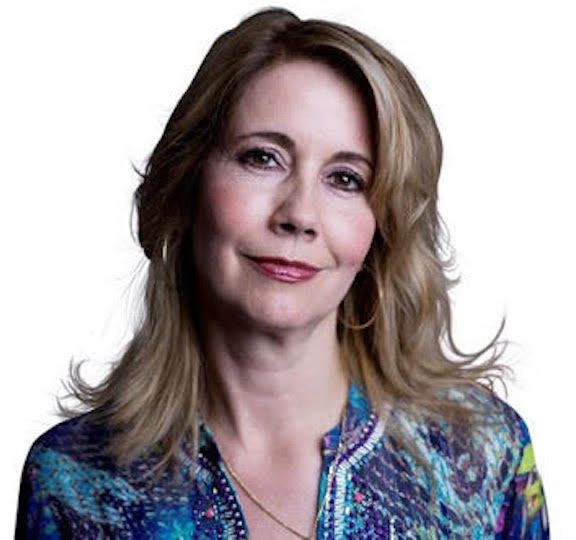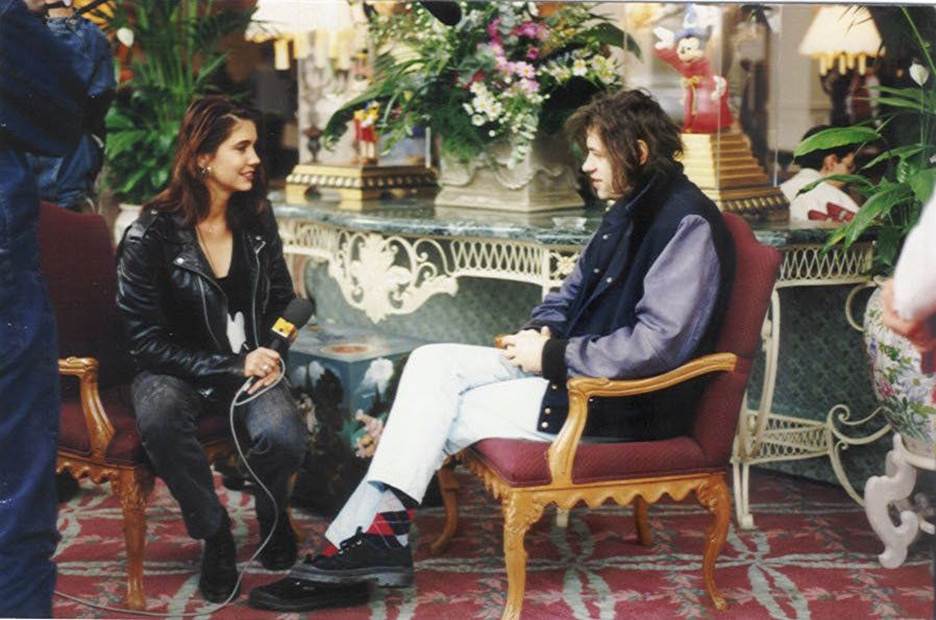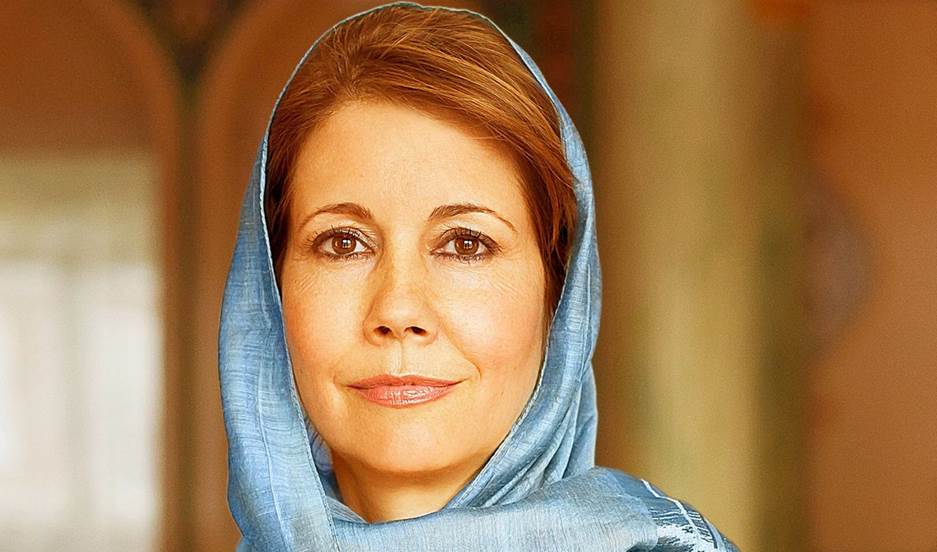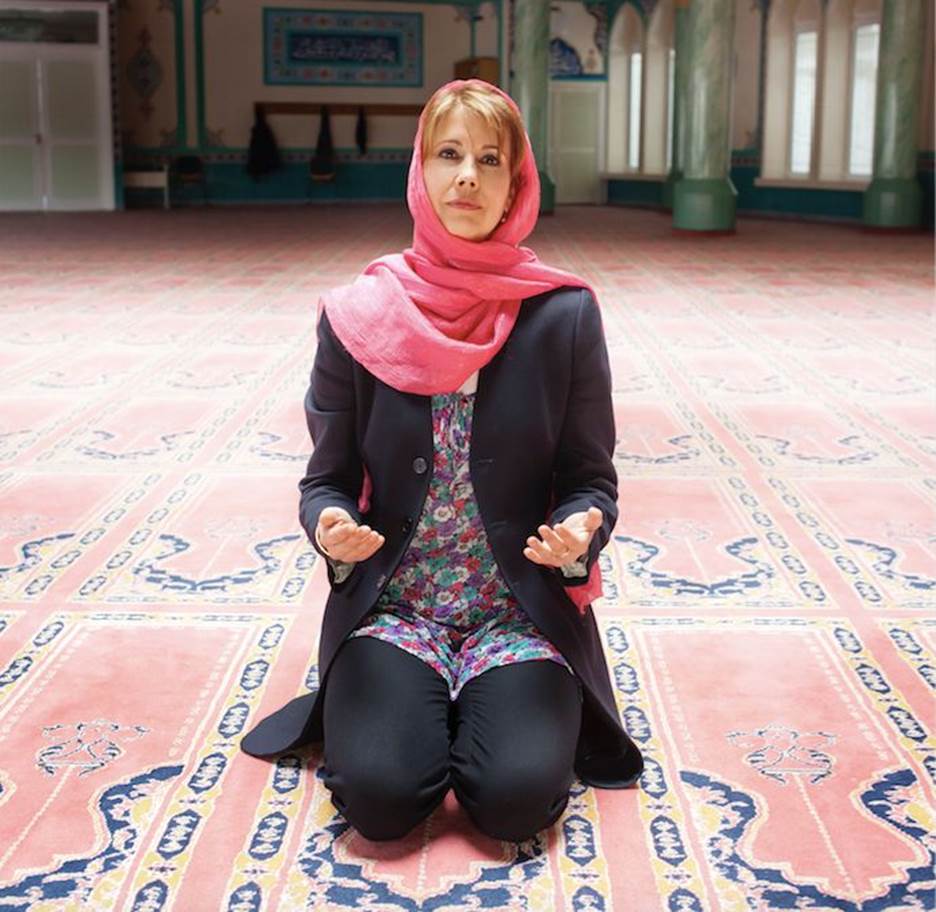
"[It’s] a religion for all times and all worlds ... I’m living proof," says Kristiane Backer - Courtesy of Kristiane Backer
This Former MTV Icon Found Inner Peace through Islam
By Dr Akbar Ahmed
American University
Washington, DC

( This series was compiled with the help of Frankie Martin and Patrick Burnett and edited and assembled by Farah Mohamed and Suzanne Gaber . The four converts, Imam Abdul Wahid Pedersen, Tim Winter, Annette Bellaoui and Kristiane Backer, also appeared in the book Journey into Europe: Islam, Immigration, and Identity.)
Berlin/London: In her early 20s, Kristiane Baker was having the time of her life. She was living her dream as a presenter for MTV Europe , brushing shoulders with celebrities like Mick Jagger and Bono on a regular basis ― and getting paid to do it. From the outside, it was everything she had ever hoped for. But on the inside, she sometimes felt a crushing sense of depression and anxiety that she couldn’t shake.
And then she met Imran Khan , the famous Pakistani cricketer who through music would lead her to Islam and a new sense of inner peace.
“He was my introduction to Islam,” she said of Khan. “I like to say I wasn’t looking, I was found.”
As a German growing up in Hamburg, Backer had always been passionate about the arts, so when she heard a qawwali, the devotional form of music often associated with Sufi Islam , during a trip to Pakistan to visit Khan, it was no surprise that she was intrigued and moved by its beauty. What was different this time though, was the depth she experienced with every note. Each lyric seemed connected to a higher form of love that could not be felt between humans.
Beyond the music, Backer said she was “very much touched by the humanity of the people, by the hospitality, by the warmth,” in Pakistan. Everyone she came across, no matter what their financial situation, was willing to donate funds to Khan’s charity project, a cancer hospital in Lahore.
“We met people who were very poor in the mountains, in the northern areas of Pakistan, who welcomed us with generosity,” she said. “Men in rags with teeth missing dropped a few rupees into Imran’s hands ― for the hospital. Women took off their jewelry and donated it for the hospital.”
Backer was in awe. She was taken aback by the stark difference between the attitudes she experienced in the entertainment industry life, especially the superficiality of Western pop music, and the spirituality she witnessed in Pakistan.
It would be three years before she finally converted to Islam, but the trip had struck a chord.
Backer began researching about Islam, spending many days with Khan constantly exposed to his religion and way of life. This, she would later admit, helped her to spiritually awaken and discover a way of life that she could truly identify with.
“I read a lot of books, and what I discovered was mind-blowing,” she said. “It was like a whole new universe. I was intrigued from the first book I read, and I wanted to know more. I realized … there is one God ... and that we’re self-responsible for our own deeds and [that] babies are born pure, not as sinners. ... I also learned how verses from the Qur’an can help me in my daily life.”
Backer was inspired by it all.
“I was convinced,” she continued. “I converted because I wanted to bring God into my life, and I wanted to purify myself to taste the spiritual fruits I was reading about.”
But just as Backer’s interest in Islam was growing, something in her life shifted again. Khan, the man she was expected to marry, abruptly ended their relationship and married another woman.
At that point, Backer no longer had a direct reason to understand Islam. If she had recoiled against Khan and his religion, it would have been understandable. Instead, she embraced the faith without skipping a beat and converted.
Islam provided Backer with the solace and strength to remain dignified throughout Khan’s instant and very public marriage to another woman. What began as a journey of discovery prompted by love for a man became a discovery of eternal love for someone else: God.
It was her newly adopted faith that helped Backer reconcile life in a glitzy pop icon world ― where she had previously felt unsure of her place ― and find meaning in European culture. There were no more clouds in her life; the confusion and inner conflict had lifted.
A Rocky Conversion
Backer is one of the most well-known German converts to Islam. But sadly, her conversion was not well-received by everyone at home.
“When it became known that I am a Muslim, a very negative press campaign followed,” Backer said. “I was an award-winning TV presenter, a popular icon over there for over seven years, and suddenly I was accused of being a supporter of terrorism. The papers suggested I had lost the plot. … Soon after, I was sacked from all my TV programs and practically lost my entertainment career in Germany.”
This reaction had surprised Backer, because while she did enjoy an increased sense of modesty in her Muslim life, she had never associated Islam with the compulsion to wear burqas or found the stereotype of repression of women in the religion to ring true in her personal experience.
“The first thing I changed was my sense of dress a little bit,” she said. “I ditched the miniskirts … I felt more feminine … Who needs those whistles on the streets?”
“I was working in this industry where the motto was: ‘If you’ve got it flaunt it,'" she continued. “And now [I was] suddenly learning about the concept of modesty. You know, how it’s actually more dignified for a woman to cover her assets and not show them to everybody.”
But others didn’t seem to understand her abrupt identity change. She found the double standard towards Muslim women confusing.
“It’s fine if you … show your tummy and have a piercing in your tummy and wear miniskirts, but it’s not fine to wear long clothes and a headscarf? That’s wrong.”
Her parents also held these unfair perceptions of Islam, and though they loved her in spite of her conversion, they struggled to move beyond them.

Backer interviews Irish singer-songwriter Bob Geldof during her time as an MTV Europe presenter - Courtesy of Kristiane Backer
“They had some serious prejudices against Islam and especially Muslim men ― prejudices that Imran’s way of ending our relationship had only confirmed,” Backer recalled. “I tried to explain to them that I had discovered the religion for myself and had made it my own. Imran had merely opened the door for me … My father even mentioned the word ‘pantheism’ ― in his view, Muslims wanted to take over the whole world. He eventually asked me to stop talking about Islam and from then on, the topic became taboo in the house.”
The reactions frustrate her to this day. In Backer’s experience, German identity is not all that different from Islamic identity, so why should she have to choose between the two?
“Being German,” she said, “doesn’t mean drinking beer and being nationalistic. I wholeheartedly believe and know that Islamic values are compatible not only with German values, [but] with European values generally. Islam is a religion for all times and all worlds ― and therefore also for Europeans in our day and age. I’m living proof.”
And the Germans before her were proof as well, Backer said. In embracing Islam and Eastern culture, she was merely following in the footsteps of Johann Wolfgang von Goethe, Martin Heidegger and Johann Christoph Friedrich von Schiller ― German thinkers who were influenced by Eastern and Islamic texts, including those by Persian poets Jalaluddin Rumi and Hafez.
But Backer’s own convictions couldn’t change the perceptions at home, and she found many German doors closed on her. Realizing that her career in Germany would be difficult to salvage, she decided to remain in London, where she had been living and working as a broadcaster since she began presenting on MTV Europe in 1989.
In England, Backer found a much different reception to her adopted religious identity. Despite continued Islamophobia across Europe, the United Kingdom had a more established group of Muslims working across the country. This was largely due to the fact that a number of Muslims in England had often come to the country for educational and intellectual pursuits, whereas those entering Germany historically came as guest workers , she said.
But life as a Muslim here isn’t entirely easy, especially as a convert. There is a sense of community among Muslims in general, Backer said, which makes the climate for converts in particular quite lonely.
“We are a minority within the minority. Where do we pray? Which mosque do we go to, the Pakistani, the Persian or the Turkish mosque?”
Initially, Backer struggled to find her place in the Muslim community in England. It wasn’t simply not having an ethnic group to latch on to, but also the fact that she hadn’t made friends and didn’t have family to break her fast with during Ramadan. Today, Backer rarely feels that her status as a convert makes her an outsider. She’s found a tiny multicultural mosque near where she lives, and she regularly breaks fasts with her large group of friends.
For Backer, the backlash she faced as a result of her conversion and her ability to move beyond that to build interfaith bridges, have only made her more determined to speak out on issues of Islam in the media. To Backer, it’s not just about combatting stereotypes head-on, but about showing how her everyday life is perfectly compatible with European life. And she hopes other Muslims in the West can continue to change the narrative in a similar way.
“Do your job ― whatever you do ― really well so people admire you,” is the advice she gives Muslims struggling to assimilate in Western society today. “Remember [that] whatever you do, … you are not only a servant of God, but also an ambassador of Islam,” she said.
But Backer knows that Muslims doing good in their own communities can only go so far, so as a member of the media, she constantly advocates for stronger and more accurate representations of Muslims in pop culture.

Kristiane Backer as featured on the cover of her book, From MTV to Mecca: How Islam Inspired My Life - Courtesy of Kristiane Backer
“Nowadays,” she said in light of the disproportional and often Islamophobic coverage of terrorist acts, Muslims need “to compensate for the news coverage in other sections of the media, to make documentaries on Muslim culture and have Muslims characters featured on soap operas.”
This need for a more accurate representation of Islam and Muslims is why she published a book about her journey to the faith. With From MTV to Mecca: How Islam Inspired My Life , Backer aspires to show Europeans that outside of the terror and suppression they see on the news, the majority of Muslims are in fact normal, wholesome and productive members of their society.
And she has already seen results. In her newfound role as a spokesperson for Islam in Europe, she’s noticed some attitudes in Germany toward her greatly improving.
Yet the future of Islam rests on the youth in the community, not her, Backer said. Young Muslims, she stressed, must teach the world that Islam is a modern religion and show people that it’s not something backward or incompatible with the West.
“Islam here in Europe is a little fossilized, and it is up to the young people to take this forward and to really look into the sources of Islam, study the religion thoroughly through contemporary and classical scholars. And then educate not only the mainstream society, but even their own parents, because I tell you, I’m always so shocked when I hear young Muslims here are losing their faith.”
Ultimately, Backer said, it’s about making others understand the faith and closing the empathy gap, like Imran Khan did with her all those years ago in Pakistan.
“It’s befriending other people; it’s reaching out,” she said. “That is how I became a Muslim. Because I was touched by the generosity and friendship and the wonderful manners of the Muslims who I met.”
Her parting advice to Western Muslims, convert and otherwise: “Never retreat just in your own Muslim bubble … Mix with mainstream society.”
If professional Muslims in the West “suddenly roll up their prayer mat in their offices and step away to pray or fast on Ramadan,” colleagues will be exposed to Islam, she said. “And [this is how they] will understand it better.”
After all, Backer said: “The beautiful values of Islam and the teaching[s] of our noble Prophet [Muhammad] are [some] of the best-kept secrets in the West. ... [It’s] time we lift that veil.”

Like Goethe before her, Backer is a bridge between Europe and the Muslim world - Courtesy of Kristiane Backer

